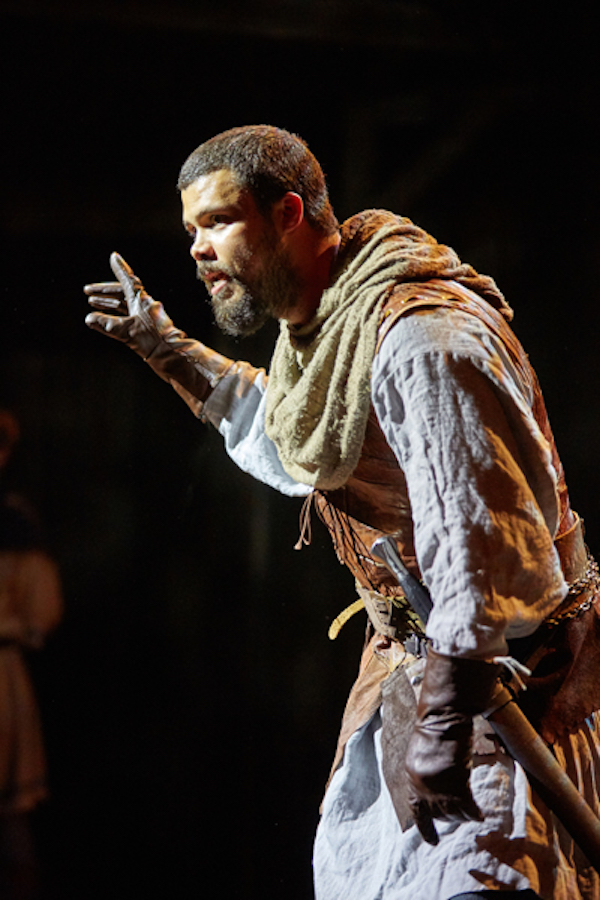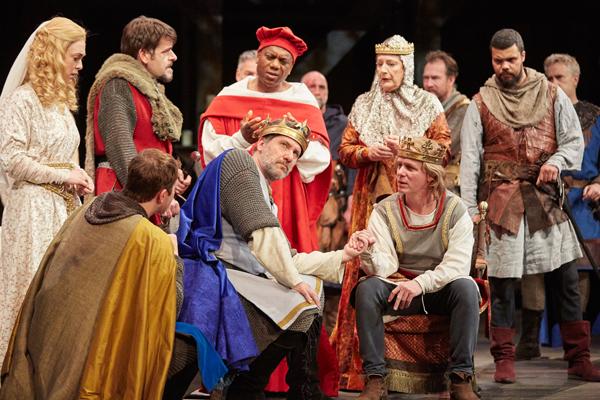According to Sellar and Yeatman in 1066 and All That, the true Bible of English history, King John was a Bad (to be exact, an Awful) King. Shakespeare had quite an interest in Bad Kings – Richards II and III were also subjected to his selective dramatist’s forensics, and like Sellar and Yeatman he only remembered the bits he wanted to remember, and then partially. Hence no Magna Carta in King John, no losing of the Crown Jewels in the Wash, and the monarch dies at operatic length of poisoning, rather than the unglamorous realities of dysentery.
The play, which the Bard left incomplete as he dashed on with greater works, has typically sharp insights in it about how invariably human ambition overrides principle in power politics, whether kings or commoners, and anyone now struggling with their feelings about the EU referendum should enjoy the cynicism of the will-they-won’t-they alliances and power negotiations between England, France and the Pope. Nothing sticks, as long as a bargaining chip can be found to change the stakes, and as long as words can be remade to express the truth of England’s eternal inviolability. Familiar?
The contrast of eras invites us to read Shakespeare's undimmed relevance to the vernacular of politics
The mockery feels timeless. However, on the human side, it feels half-baked, bursting with ingredients better and more richly dealt with in other plays. The mad king here is puny rather than tragic, nor do we quite feel the warnings (possibly coded to Queen Elizabeth) about royal autocracy, as you have in Richard II, where the king is just as insistent on his divine right but not so mad that he can be easily dismissed. And God has only a bit part, unusually – the rich, troublesome, bloody part that religion had played in the purpose and power of monarchy is treated in King John as something of a joke, Cardinal Pandulph given a camp, orotund, and excellently articulated performance by Burt Caesar.
Or perhaps that's the republican angle I’ve taken home from Trevor Nunn’s down-to-earth production, consistent with his previous Wars of the Roses trilogy. He uses the modern revision of the text that incorporates some of Shakespeare’s original sources to fill out the narrative, and this does mean that a great deal of jaw-jaw is interspersed with war-war, which Nunn’s designers project in rather awesome Eisenstein-ish black-and-white film sequences on big screens either side of the stage. As the Rose’s stage itself has been transformed by carpentry with medieval wooden balconies and doorways – into the old Rose, perhaps, where Shakespeare’s early plays were first put on – this contrast of eras invites us to read Shakespeare’s undimmed relevance to the vernacular of politics.
And how easy some of the lines make it: “That smooth-faced gentleman, tickling Commodity,/ Commodity the bias of the world”, and “’Twas ever thus, and will be”, and “While I am a beggar, I will rail/ And say there is no sin but to be rich;/ And being rich, my virtue then shall be/ To say there is no vice but beggary.” The witty character of the Bastard Faulconbridge is the audience's entry point – a jesting journeyman who seizes reality, and unemotionally accepts a sudden change of parentage, discovering belatedly that he is Richard the Lionheart’s bastard child, as a career decision.
 Faulconbridge’s rational opportunism and realpolitik is a somewhat schematic counterweight to the completely barking king, John, who has all the intransigent vanity of his descendant Richard II but none of the noble aspiration. Jamie Ballard, with raggedy long hair, rolling eyes, and a malicious, suspicious edginess in every twitch, gives an eye-catchingly nutty performance, grabbing his crown in both hands like a child clinging to his toy bear. At one point he even bites like a wild animal at the King of France during their arm-wrestling negotiations – the best, most suspensefully staged scene in the play as the cast crowd around the kings.
Faulconbridge’s rational opportunism and realpolitik is a somewhat schematic counterweight to the completely barking king, John, who has all the intransigent vanity of his descendant Richard II but none of the noble aspiration. Jamie Ballard, with raggedy long hair, rolling eyes, and a malicious, suspicious edginess in every twitch, gives an eye-catchingly nutty performance, grabbing his crown in both hands like a child clinging to his toy bear. At one point he even bites like a wild animal at the King of France during their arm-wrestling negotiations – the best, most suspensefully staged scene in the play as the cast crowd around the kings.
Howard Charles’s mixed-race appearance as Faulconbridge (pictured above right) enables knowing jokes with the audience about his disputed parentage, as well as responding to the well-publicised attacks on Nunn's previous all-white casting of The Wars of the Roses (and Burt Caesar too, of course, is black). Charles cuts a handsome, virile and well-spoken figure on stage, though the part doesn’t really go anywhere after its entertaining opening.
Also falling victim to the play’s dramatic fall-off are the only women, the two queens in the chess game and two of the best actors there: the elderly but frighteningly dominant Queen Elinor – mother of Richard and John, and “grandam” of young Arthur, the son of dead middle son Geoffrey, whose claim to the throne should override John’s; and her daughter-in-law, Arthur’s mother Constance, who seeks French help to place her boy on the English throne. As Elinor Maggie Steed looks and sounds startling, a grandmother wearing chainmail over her damask gown, maximising the contrast vocally between mental indomitability and physical frailty, and unafflicted with inconvenient maternal emotions.
The role of Constance is less forgiving, very verbose, and Lisa Dillon invests it strikingly with vehement gestures and the tone of the professional complainer – it’s amusing and authentic to see her teenage son Arthur so visibly bored by his mother’s going on and on and on about stuff. And in the process, not taking the threat to his life seriously enough.
Nunn’s production does a decent job, then, of offering the best bits of a mixed play, with kings as dogs snarling ignobly over the bones of power, just as we like to type them. But dramatic, tense, moving, unsettling, as Shakespeare could be? No. Not Bad exactly, but not quite a Good Thing.
- King John at the Rose Theatre, Kingston, until 5 June















Add comment